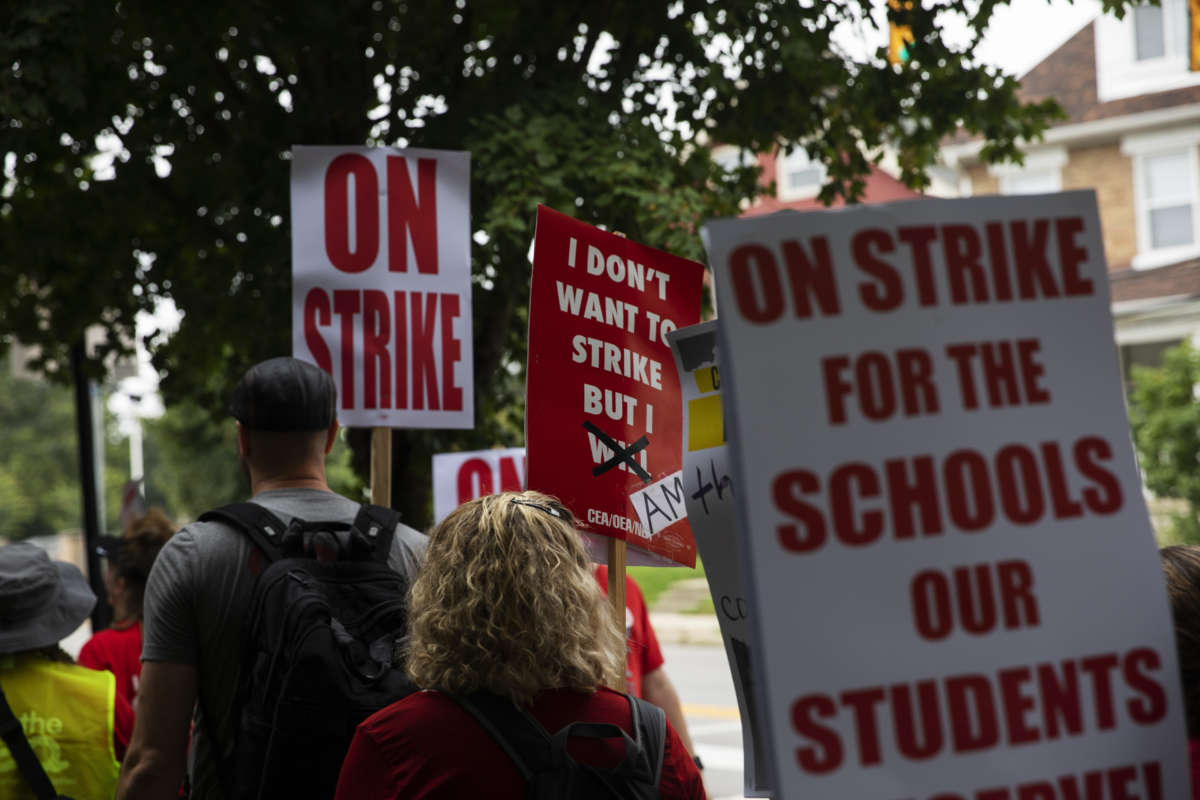Truthout is an indispensable resource for activists, movement leaders and workers everywhere. Please make this work possible with a quick donation.
This article was originally published on Waging Nonviolence.
As students across the country return to their classrooms for the 2022-2023 academic year, teachers and other employees have been raising the alarm over widespread staffing shortages, low pay, safety concerns and unfair contracts.
On Monday, over 500 staff members at American University in Washington, D.C. kicked off a five-day strike demanding higher wages and equitable pay structures after weeks of failed contract negotiations between the university and SEIU Local 500, which represents the workers.
Many of the striking workers serve as advisers for first-year students, including Roshan Abraham. The employees first unionized in 2020, but he says they have struggled to secure good faith negotiations from the university and have failed to reach a fair contract since then.
“The first semester is largely about personal development, and what it means to be in a community, and the second semester is about anti-racism and anti-oppression,” Abraham said. “What I teach my students is what I’m living right now — part of the reason I’m on strike is because I actually believe the stuff I teach my students.”
The university staff members, including administrators who may make as little as $32,000 per year, voted 91 percent in favor of the strike, and are demanding a wage increase of 9 percent over two years to correspond with the rate of inflation. They’ve also filed unfair labor practice charges against the university for explicitly excluding employees in the union’s bargaining units from merit-based raises.
According to Abraham, the higher wages will ultimately benefit students, who often cycle through multiple advisors in their first year due to the department’s high turnover rate. Even as they’ve faced resistance from the university administration, Abraham says the striking workers have experienced an outpouring of support from students and non-unionized colleagues.
“Our president is amongst the most well-paid presidents in the country — they could settle this contract for less than that,” said Abraham, referring to university president Sylvia Burwell, who earns over $1 million per year. “Instead, they’ve dug their heels, and have ignored us and stonewalled us. Their plan was clearly to wait us out.”
Other labor actions among educators and school staff have been linked to widespread staffing shortages, often driven by low pay and a sense of burnout exacerbated by the pandemic. On the K-12 level, teachers have also expressed exasperation with the so-called culture wars’ increasingly restrictive attacks on anti-racist education and LGBTQ rights in schools.
On Wednesday, the first day of classes was delayed in one of Seattle’s largest school districts after members of the Kent Education Association voted to strike over the district’s failure to negotiate a contract with adequate pay and more manageable class sizes. In Philadelphia, roughly 4,000 school district workers, including bus drivers and cleaners, represented by 32BJ SIEU voted to authorize a strike if the district is unable to negotiate a new contract offering higher salaries and better training.
And, in Ohio’s largest school system, staff reached a “conceptual agreement” with the Columbus Board of Education after roughly 4,500 teachers, librarians, nurses, counselors and other employees went on strike for the first time since 1975 on the first day of school.
For four days, strikers, parents and students picketed for hours at 20 different locations across the 47,000-student system. The strike came after five months of failed negotiations, and a Columbus Education Association vote in which 94 percent of members rejected the district’s most recent offer.
The teachers were calling for officials to address issues with the heating and air conditioning systems in the district’s buildings, as well as more planning time for teachers, curriculum changes and solutions to large class sizes. They carried signs that said “Columbus schools deserve working air,” “a history lesson in progress,” and “on strike for the schools our students deserve.”
“In multiple efforts to negotiate through the media after walking away from the bargaining table, the school board has tried desperately to make this strike about teacher salary, teacher professional development and teacher leaves,” CEA spokesperson Regina Fuentes said in a statement.
“Let me be clear. This strike is about our students who deserve a commitment to modern schools with heating and air conditioning, smaller class sizes, and a well-rounded curriculum that includes art, music and P.E.”
A terrifying moment. We appeal for your support.
In the last weeks, we have witnessed an authoritarian assault on communities in Minnesota and across the nation.
The need for truthful, grassroots reporting is urgent at this cataclysmic historical moment. Yet, Trump-aligned billionaires and other allies have taken over many legacy media outlets — the culmination of a decades-long campaign to place control of the narrative into the hands of the political right.
We refuse to let Trump’s blatant propaganda machine go unchecked. Untethered to corporate ownership or advertisers, Truthout remains fearless in our reporting and our determination to use journalism as a tool for justice.
But we need your help just to fund our basic expenses. Over 80 percent of Truthout’s funding comes from small individual donations from our community of readers, and over a third of our total budget is supported by recurring monthly donors.
Truthout has launched a fundraiser to add 500 new monthly donors in the next 9 days. Whether you can make a small monthly donation or a larger one-time gift, Truthout only works with your support.
